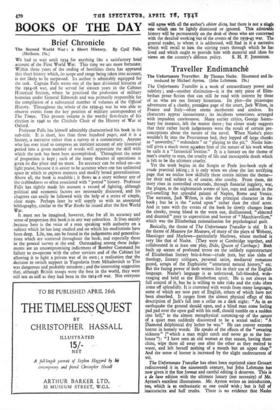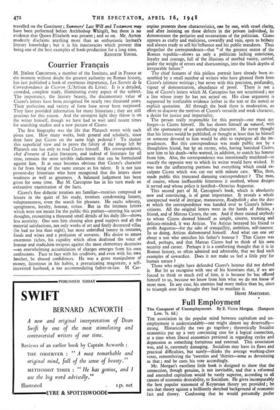Traveller Endimanche
The Unfortunate Traveller. By Thomas Nashe. Illustrated and In- troduced by Michael Ayrton. (John Lehmann. 15s.) The Unfortunate Traveller is a work of extraordinary power and subtlety ; and—another distinction—it is the only piece of Eliza- bethan prose fiction that can still be read with interest by those of us who are not literary historians. Its plot—the picaresque adventures of a cheeky, penniless page of the court, Jack Wilton, in France and Italy—often seems incoherent and aimless. Its characters appear inconsistent; incidents sometimes arranged with impudent carelessness. any earlier critics, George Saints- bury for instance, left the matter there ; but closer study suggests that their rather harsh judgements were the result of certain pre- conceptions about the nature of the novel. When Nashe's piece wouldn't fit into the Procrustean bed, they lopped off large chunks
as " unworthy," " redundant " or " playing to the pit." Nashe him- self gives a much more acociittate hint of the nature of his work when he calls it a "fantastical treatise." It is a fantasy on the theme of man's cruelty to man, the cruelty of life and inescapable death which is felt to be the ultimate cruelty.
Yet the work begins in the Scogin or Peele jest-book style of crude practical joking ; it is only when we close the last terrifying
page that we realise how skilfully these stories initiate the theme— for their real subject is, of course, also cruelty. From them, the story rises in controlled crescendo, through financial jugglery, war,
the plague, to the nightmarish scenes of lust, rape and sadism in the
evil-smelling but splendid palazzi of Naples, Rome and Venice. The narrator, Jack Wilton, is also the principal character in the
book ; but he is the " acted upon " rather than the chief actor. And in tune with the events of the book he slowly changes from the cheeky, young blood to the worn out, disillusioned, " abjected and daunted " prey to superstition and horror of " Macchiavellism," which was the Elizabethan rationalisation for psychological guilt.
Basically, the theme of The Unfortunate Traveller is old. It is the theme of Measure for Measure, of many or the plays of Webster,
Massinger and Marlowe—particularly Marlowe, whose method is very like that of Nashe. (They were at Cambridge together, and collaborated in at least one play, Dido, Queen of Carthage.) Both built up scenes of profound terror on the unlikely superstructure
of Elizabethan literary bric-à-brac--crude jests, but also slabs of theology, literary critiques, personal satire, mediaeval romances
guyed, scraps of the Euphuistic "unnatural natural history," etc.
But the fusing power of both writers lies in their use of the English language. Nashe's language is as unfettered, full-blooded, wide-
ranging and bold as the Elizabethan spirit. He is not always in full control of it, but he is willing to take risks and the risks often come off splendidly. It is crammed with words from many languages, some of which are now part of English, others of which have not been absorbed. It ranges from the almost physical effect of this description of Jack's fall into a cellar on a dark night: "As in an earthquake the ground should open, and a blind man come feeling pad pad over the open gulf with his staff, should tumble on. a sudden into hell," to the almost metaphysical summing-up of the nature of a quiet man suddenly discovered to be a sexual sadist: "A• Diamond delphinical dry lecher he was." He can convey extreme horror in homely words. He speaks of the effects of the sweating sickness " (" which a man might catch and never go to the hot- house "): " I have seen aft old woman at that season, having three chins, wipe them all away one after the other as they melted to water, and left herself nothing of a mouth but an upper chap." And ihe sense of horror is increased by the slight undercurrent of wit.
The Unfortunate Traveller has often been reprinted since Grosart rediscovered it in the nineteenth century, but John Lehmann has now given it the fine format and careful editing it deserves. This is a de luxe edition with the ultimate luxury (not necessity) of Mr. Ayrton's excellent illustrations. Mr. Ayrton writes an introduction, too, which is as enthusiastic as one could wish • but is full of inaccuracies and half truths. There is no evidence that Nashe travelled on the Continent ; Summers' Last Will and Testament may have been performed before Archbishop Whitgift, but there is no evidence that Queen Elizabeth was present ; and so on. Mr. Ayrton modestly disclaims anything more than an enthusiastic layman's literary knowledge ; but it is his inaccuracies which prevent this being one of the best examples of book-production for a long time.
KENNETH YOUNG.































 Previous page
Previous page